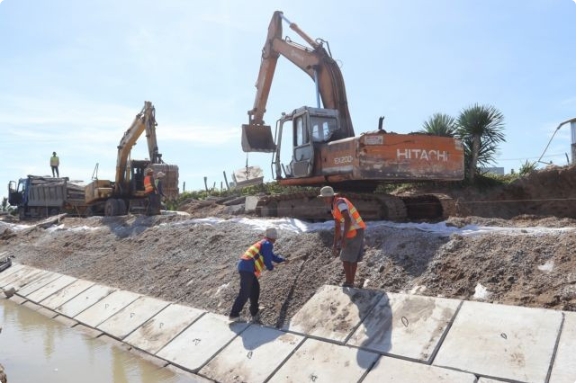Working groups established to speed up public investment disbursement
Prime Minister Pham Minh Chinh has established eight working groups to remove difficulties related to production, business, infrastructure construction, and imports and exports, as well as promote growth and accelerate disbursement of public investment capital.

The PM’s Decision 1544/QD-TTg, issued on July 16, clearly states that the eight working groups, headed by Government leaders, aim to achieve and exceed the economic growth target of over 8% this year and double digits in the following years.
Working Group 1, led by PM Chinh, monitors Hanoi, Ho Chi Minh City, and Can Tho.
Deputy PM Nguyen Hoa Binh will lead Working Group 2, which is in charge of the National Assembly Office, the Government Office, the Supreme People's Court, the Supreme People's Procuracy, the Ministry of National Defence, the Ministry of Public Security, the Ministry of Home Affairs, the Government Inspectorate and the Vietnam Cooperative Alliance, as well as localities including Hue, Da Nang, Quang Ngai, Gia Lai and Bac Ninh.
Working Group 3 is managed by Deputy PM Tran Hong Ha. It will monitor the Ministry of Agriculture and Environment, the Ministry of Construction, the Party Central Committee Office, the President Office, the Vietnam Fatherland Front Central Committee, Vietnam National University - Hanoi and Vietnam National University - HCM City, as well as An Giang, Ca Mau, Dong Thap and Vinh Long provinces.
Led by Deputy PM Le Thanh Long, Working Group 4 is responsible for the Ministry of Justice, the Ministry of Education and Training, the Ministry of Health, the National Committee of the Vietnam Union of Literature and Arts Associations, the Vietnam Journalists Association, the Vietnam Writers Association and the Vietnam Lawyers Association along with Dak Lak, Khanh Hoa and Lam Dong provinces.
Working Group 5, headed by Deputy PM Ho Duc Phoc, will oversee the Ministry of Finance, the State Bank of VienNam, the Vietnam Development Bank, the Vietnam Bank for Social Policies, the State Audit and localities including Dong Nai, Hung Yen, Quang Ninh and Hai Phong.
Managed by Deputy PM Bui Thanh Son, Working Group 6 is keeping a close watch on the Ministry of Foreign Affairs, the Ministry of Industry and Trade, and Vietnam Electricity along with Tuyen Quang, Cao Bang, Lang Son, Thai Nguyen and Phu Tho.
Working Group 7 is guided by Deputy PM Nguyen Chi Dung, and manages the Ministry of Science and Technology, the Vietnam Academy of Science and Technology, the Vietnam Academy of Social Sciences, the Vietnam Union of Science and Technology Associations as well as Ninh Binh, Thanh Hoa, Nghe An, Ha Tinh and Quang Tri provinces.
Deputy PM Mai Van Chinh will lead Working Group 8, which is in charge of the Ministry of Culture, Sports and Tourism, the Ministry of Ethnic Minorities and Religions, the Ho Chi Minh National Academy of Politics, the Vietnam News Agency, the Voice of VienNam, Vietnam Television and Tay Ninh, Dien Bien, Lai Chau, Son La and Lao Cai provinces.
The deputy heads of the working groups are the leaders of the Ministry of Finance.
The groups’ members include the heads of the ministries of construction, agriculture and environment, industry and trade, justice, the Government Office and a number of related agencies.
The Ministry of Finance is the standing body of the working groups and is responsible for assisting the groups’ leaders in preparing their reports on working results, proposals and recommendations to send to the Government at regular Government meetings.
Based on monthly disbursement data, the groups will publicly disclose the list of ministries, central and local agencies with disbursement rates below the national average, which will require inspections.
The list will be published on the National Information System on Public Investment and on the Ministry of Finance's portal.
The groups will instruct ministries, central and local agencies to submit written reports on the disbursement situation at the end of each month, which will be sent to the Ministry of Finance as well as the Government Office.
Duties and powers
The PM's decision also regulates the working groups’ tasks, specifically reviewing and analysing any causes of difficulties and proposing solutions.
The work will be reported to the Government before the 25th of each month.
The working groups will review responsibilities in leadership, direction, supervision, inspection and handling of difficulties at ministries, agencies and localities, including responsibilities of the heads.
Each working group has the right to ask ministries and central and local agencies to provide information and assign staff to coordinate with them in performing these tasks.
The working group leaders will assign tasks to the groups’ members and develop a working plan that clearly identifies obstacles and the authority to resolve issues.
On that basis, they will direct resolutions according to their authority and legal regulations, and at the same time summarise their work to report to relevant authorities.
The PM’s decision comes into force from the date of signing and promulgation.



